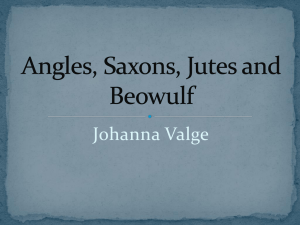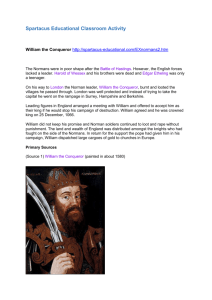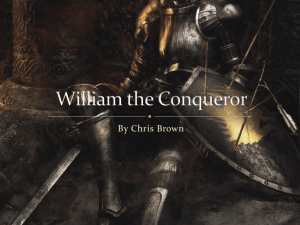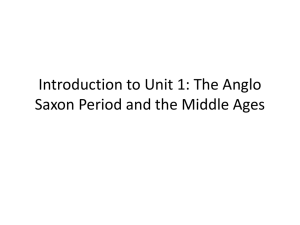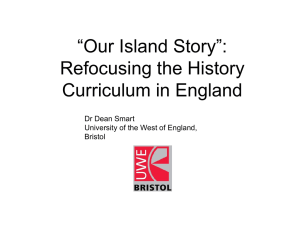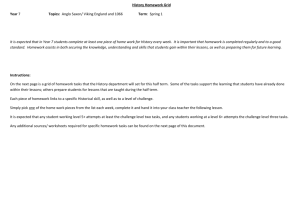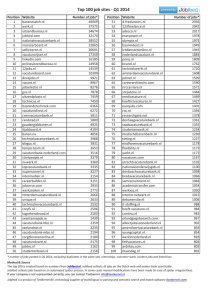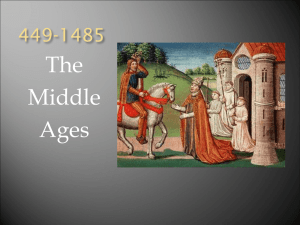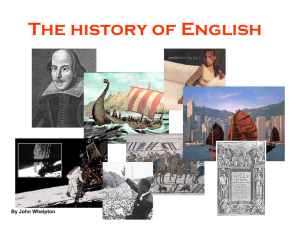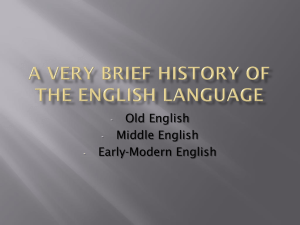From Beowulf to Hamlet – crossword and quiz
advertisement
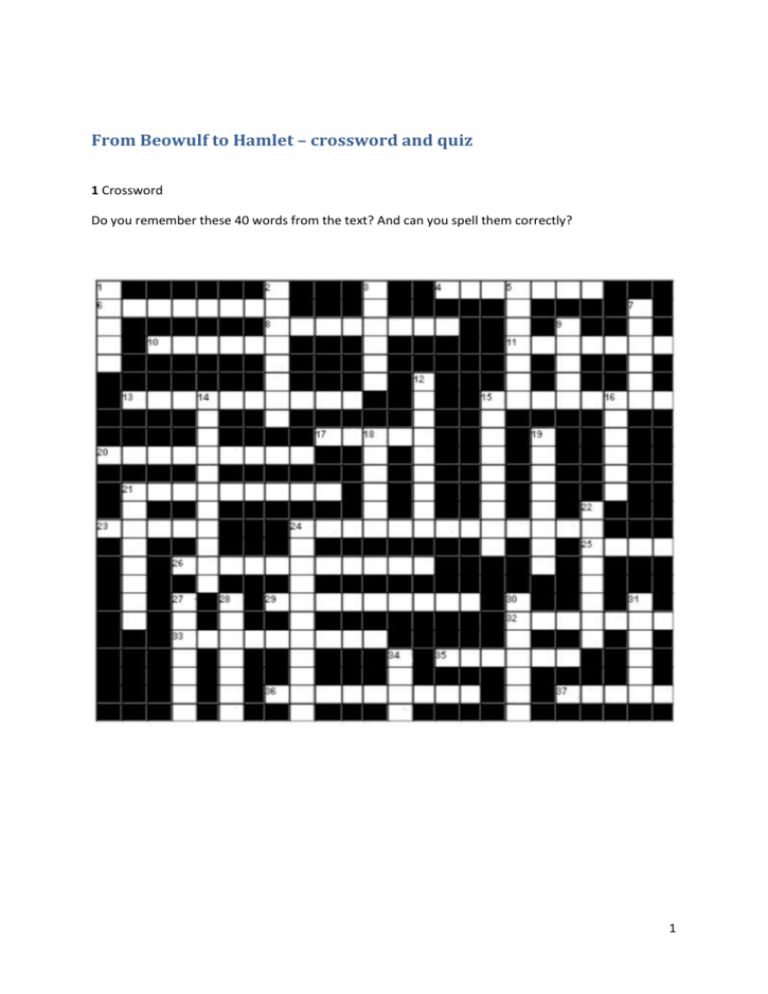
From Beowulf to Hamlet – crossword and quiz 1 Crossword Do you remember these 40 words from the text? And can you spell them correctly? 1 Across Down 4 bonde 1 blande seg med 6 språk 2 handelsmann 8 slektning 3 å angripe 10 keltisk 5 å overleve 11 variant 7 slå seg ned 13 høflighet 9 en stamme 15 slått ut 12 oppfinnelse 17 smelte sammen 14 fantasi 20 gjenkjenne 15 å forsvinne 21 å uttale 16 tropper 23 hoff 18 å forbli 24 uttale 19 adel 25 å utviske 21 gjennomgripende 26 suverenitet 22 uformell 29 dømt 24 forgjenger 32 angriper 27 seier 33 erobreren 28 århundre 35 ridder 30 pilegrim 36 14 dager 31 å beholde 37 å innvilge 34 å herje 2 Key 3 2 Put the sentences in the right order to make a coherent text. Before you start: The first sentence is usually a sentence which introduces the topic of the text in a general way. The second sentence takes one thing from the introductory sentence and expands upon it. From then on you have to make sure the text becomes coherent: that the different sentences fit together in a logical way and that words like "but" and "however" make sense in the context. Also make sure that words that "these", "those", "this" and "that" really refer back to the correct words in the previous sentence. TEXT But most of the Celtic speakers were pushed west and north by the invaders - mainly into what is now Wales, Scotland and Ireland. At that time the inhabitants of Britain spoke a Celtic language. The history of the English language really started with the arrival of three Germanic tribes who invaded Britain during the 5th century AD. The Angles came from Englaland and their language was called Englisc - from which the words England and English are derived. These tribes, the Angles, the Saxons and the Jutes, crossed the North Sea from what today is Denmark and northern Germany. Suggestion: The history of the English language really started with the arrival of three Germanic tribes who invaded Britain during the 5th century AD. These tribes, the Angles, the Saxons and the Jutes, crossed the North Sea from what today is Denmark and northern Germany. At that time the inhabitants of Britain spoke a Celtic language. But most of the Celtic speakers were pushed west and north by the invaders - mainly into what is now Wales, Scotland and Ireland. The Angles came from Englaland and their language was called Englisc - from which the words England and English are derived. You can find this short text and more about the history of the English language at this website: http://www.englishclub.com. [http://www.englishclub.com/english-language-history.htm] 4 2 QUIZ Prepare for the quiz at this website: http://www.englishclub.com. [http://www.englishclub.com/english-language-history.htm] Tick off the correct answer(s). There might be more than one correct answer to each question. [Tilbakemeldinger står i parentes. Riktige svar (flere muligheter) står i halvfet skrift.] 1. Which of the following Germanic tribes invaded Britain after the Romans had left? [ ] the Angles [ ] the Saxons [ ] the Jutes [ ] the Celts [They were not Germanic, and besides, they already lived in Britain.] [ ] the Geats [They were a tribe from southern Sweden to which Beowulf belonged.] 2. When did these Germanic tribes invade Britain? [ ] in the 4th century AD [This is too early.] [ ] in the 5th century AD [ ] in the 6th century AD [This is too late.] [ ] in the years 400 – 500 AD [ ] in the years 500 – 600 AD [This is the same as the 6th century, which is too late.] 3. What kind of language(s) did the people living in Britain at that time speak? [ ] a Celtic language [ ] a Germanic language [ ] a Nordic language [ ] an Italic language [ ] a Slavic language 5 4. What can you say about the connection between Old English and Modern English? [ ] Old English is no longer connected to Modern English. [Old English is the predecessor of Modern English and therefore there is a strong connection between the two.] [ ] Old English is fairly easy to understand for native speakers of English today. [No, it requires a lot of studying and practice to understand Old English.] [ ] Old English is very different from modern English. [ ] Old English is the ancestor of modern English. [ ] Old English and Modern English are both strongly influenced by French. [No, only Old English was strongly influenced by French and eventually became Middle English.] 5. Which of the following statements about William the Conqueror are true? [ ] William the Conqueror came from Normandy in France. [ ] William was called "The Conqueror" because he conquered Britain. [ ] William the Conqueror defeated King Harald Hardrade of Norway. [No, King Harold II defeated the Norwegian king.] [ ] William the Conqueror defeated the Anglo-Saxon king Harold II. [ ] William the Conqueror defeated both the Anglo-Saxon king Harold II and King Harald Hardrade of Norway. [No, he only defeated king Harold II.] 6. Why is the year 1066 so important in British history? [ ] In 1066 England got a new king and a new royal family. [ ] 1066 was the start of centuries of conflicts and wars between England and France. [ ] In 1066 Christianity was introduced in England by William the Conqueror. [No, Christianity was introduced much earlier, around AD 600.] [ ] In 1066 England, Wales and Scotland became one kingdom ruled by William the Conqueror. [No, Scotland remained a separate kingdom until 1707.] [ ] In 1066 the French language was introduced in England by the new king and this brought about sweeping changes in both English society and the English language. 7. What aspects of the English language were influenced by French after 1066? [ ] Pronunciation [ ] Spelling [ ] Vocabulary: the introduction of new words [ ] Vocabulary: existing words acquired new meanings [ ] Grammar 6 8. In what language did Geoffrey Chaucer write his famous "Canterbury Tales"? [ ] Old English [No, this was long before Chaucer.] [ ] Old Norse [No, this was the language of the Vikings.] [ ] Middle English [ ] Anglo-Norman [No, this was the language of William the Conqueror.] [ ] Anglo-French [No, this was a kind of dialect of Anglo-Norman, the language of William the Conqueror.] 9. Why was the invention of the printing press such an important event in the history of the English language? [ ] The printing press meant that books became cheaper and more people learned to read. [ ] The printing press meant that the English language became fixed and stopped changing. [No, spelling and grammar became more fixed, but the language definitely kept on changing.] [ ] The printing press brought standardization to the English language, especially with regard to spelling. [ ] The printing press meant that the London dialect became the standard variety of English with regard to spelling and grammar. [ ] The printing press brought standardisation to the pronunciation of English and reduced the differences between the different dialects. [No, pronunciation was not really standardised, there are still many different dialects around the country.] 10. Why was there such an increase in the number of English words in the 18th and 19th century? [ ] Famous authors like Charles Dickens and Jane Austen coined many new words that became very popular. [No, they might have popularized certain words, but not so many that they can be credited with expanding the vocabulary of the English language.] [ ] New technology and inventions created a need for many new words. [ ] The British Empire consisted of many countries around the world and they contributed with many new and foreign words to the English language. [ ] The Americans replaced many old words with new words, like pants for trousers and fall for autumn, thus increasing the total number of English words. [No, on the contrary. The Americans often kept the older versions of words, whereas the British acquired new ones.] [ ] Many existing words acquired new meanings. [This is true to a certain extent, but it does not concern so many words that we can say that this is a major reason for the clear increase in new words during this period.] © Julia Kagge/H. Aschehoug & Co. 7
